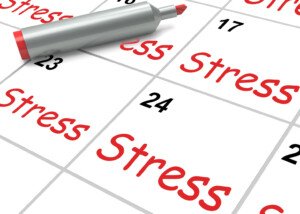
You’ve heard that stress can interfere with weight loss efforts, but can a lot of anxiety cause fat loss even if you don’t eat less?
It’s a no-brainer that weight loss will occur from eating less due to suppressed appetite from stress.
“Nobody lives life completely devoid of stress; however, there are times in all of our lives when stress and the associated anxiety that can accompany a significantly greater stressful situation than usual, can be more taxing than we even realize,” says Richard Kelley, MD, a practicing physician in Texas for 20+ years, and author of “The Fitness Response,” “The Three-Hour Appetite” and the ebook, “The Fitness Response ‘Diet’ for Women.”
He continues, “Prolonged stress and anxiety can take a significant toll on one’s health, inducing weight loss, insomnia, gastrointestinal problems and general irritability.”
“Weight loss as a result of increased stress and anxiety may occur for a variety of reasons.
“When we are chronically stressed and anxious, whether we realize it or not, nutrition may suffer due to skipping meals.
“For individuals caring for an ill family member for extended periods of time, either at home or in the hospital, one’s sense of time can be altered, resulting in skipped meals or prolonged periods between nutrition.
“It is not unusual for a family member in the chronic caretaker role, to feel they are eating adequately and even have an increased sense of hunger when they do eat, simply because their schedule, secondary to their caretaking role, is more erratic.”
I had unexplained weight loss while caring for my mother following her quintuple bypass surgery.
However, I was acutely aware of my eating habits simply because I’m a health-conscious person, always striving to increase my muscle mass.

When I began noticing the weight loss, I began tracking caloric intake, even though I knew I was eating more than usual (e.g., many thick personal pizzas at the hospital; my mother had four more hospital admissions after the initial one).
There were three or four days at the beginning where I didn’t eat much, but the rest of the days I ate generously, including a rich homemade chocolate milkshake every day, but lost fat rather quickly.
“Individuals who maintain a fitness-oriented lifestyle and regularly stimulate and activate their skeletal muscle, may find that they lose weight (body fat) over months in a stressful situation, eating even more calories than usual, simply because their focus has been on maintaining their skeletal muscle through their regular routine of resistance training, prior to the period of prolonged stress,” says Dr. Kelley.
“Many people disregard the power and impact of a well maintained musculoskeletal system, but muscle plays a significant role in helping people burn calories, often in the presence of increased caloric intake.”
But why the sudden fat loss in my case?
After all, my body already had the muscle development.
“Prolonged anxiety, in and of itself, may result in a tendency to lose weight,” says Dr. Kelley.
“Anxiety may enhance adrenal activity, producing higher levels of hormones such as adrenaline and cortisol, which increase heart rate and blood pressure.
“This would also represent an elevation in metabolic rate, which over time, could result in the loss of weight.
“Elevated cortisol levels have traditionally been viewed as increasing one’s tendency to store abdominal fat.
“Its role, if any, in the weight loss process, as a result of prolonged stress, is not well-understood.
“Though the argument could be made that prolonged stress and anxiety result in a more consistent elevation of adrenaline than cortisol, over time, or that the impact of the fight or flight hormones simply exert more visible impact (weight loss) over the course of time, than that of cortisol.”
Dr. Kelley also points out (though this didn’t apply to my case) that stressed caregivers sometimes subsist largely on coffee, soda and cigarettes to stay alert, and these substances elevate adrenaline and suppress appetite.
“Ultimately, I believe prolonged stress and anxiety may have a tendency to skew our view concerning the accuracy of our nutrition recall.
“In my own weight management practice, I can say with certainty that most individuals have very poor recall of exactly what and how they have eaten, over the course of several days, a week or a month, if they don’t journal their food intake.
“We are even less likely to fully appreciate how well we are doing, nutritionally, when we are in a state of chronic, prolonged stress.”
In conclusion, a sudden bout of extreme stress can cause weight loss even if you don’t eat less; even if you eat more; and especially if you already have a trained body.

 Richard Kelley, MD,
Richard Kelley, MD,
























